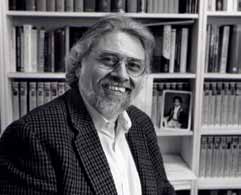Saying Yes to Technology
TC alumnus Frank Moretti is a worldwide force in digital education
From curricula by Margaret Crocco to the Global Classroom at Jeffrey Sachs’ Earth Institute, much “new media” in Morningside Heights and beyond comes courtesy of Frank Moretti and his Columbia Center
The Center was dreamed up by Moretti (who holds an appointment at TC as Professor of Communications) and his former TC thesis advisor, Robbie McClintock, and launched in 1999 by Moretti and Maurice Matiz. Housed on Columbia 168th Street
“We’re information consultants who promote the purposeful use of technology in education,” says Moretti, a bearded ex-teacher of high school Greek, Latin and philosophy who looks like a milder Ernest Hemingway.
The Center builds or partners on technologies like CourseWorks, an online course management system that supports 6,000 offices of instruction. It helps organizations inside and outside Columbia
At TC, CCNMTL has worked with psychologist Herbert Ginsburg to develop VITAL, a tool that archives video and embeds it, footnote-style, in text, so that academic papers become multimedia presentations. CCNMTL was also the lead partner with WGBH Public Television in Boston in creating “Vietnam Online,” a digital library anchored by footage from the station’s landmark 1980s documentary, Vietnam
How did a former humanities guy become a worldwide force in digital technology?
“Meeting Robbie was the key,” says Moretti, who, as a history doctoral student at TC in 1969, secured McClintock as his advisor and Lawrence Cremin and Maxine Greene on his dissertation committee. “He had a room-sized word processor that had 256K memory and giant floppies. He and I taught human communications, about the emergence of printing and the formation of nation states. We looked at what was going on around us with computers, and we said, Jeez, we’re living in another great revolution.”
Later, as Associate Headmaster of Dalton, a private school in Manhattan
we produced something that Time featured in a story on the new world of learning. After that, McKinsey [the consulting organization] used us to instruct CEOs, and it built from there.”
Ultimately, Moretti retains a philosopher’s perspective. “Twitter, Facebook—who ever thought capitalism would get to the point where the product is created by the consumer?” He laughs uproariously. “Marx would have loved it!”
Published Friday, Dec. 4, 2009
